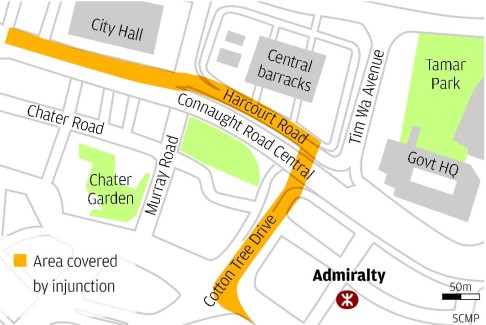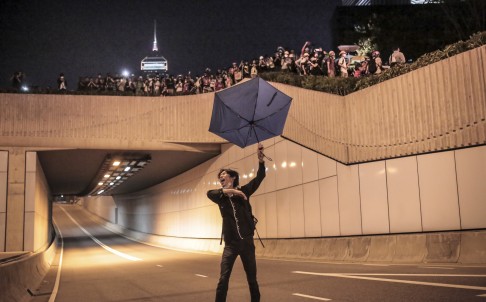Occupy Central
Occupy Central is a civil disobedience movement which began in Hong Kong on September 28, 2014. It calls on thousands of protesters to block roads and paralyse Hong Kong's financial district if the Beijing and Hong Kong governments do not agree to implement universal suffrage for the chief executive election in 2017 and the Legislative Council elections in 2020 according to "international standards." The movement was initiated by Benny Tai Yiu-ting (戴耀廷), an associate professor of law at the University of Hong Kong, in January 2013.
Umbrella Movement
The Umbrella Movement (Chinese: 雨傘運動; pinyin: yǔsǎn yùndòng[1]) is a loose political movement that was created spontaneously during the Hong Kong protests of 2014.[2] Its name derives from the recognition of the umbrella as a symbol of defiance and resistance against the Hong Kong government, and the united grass-roots objection to the decision of the Standing Committee of the National People's Congress (NPCSC) of 31 August.
The movement consists of individuals numbering in the tens of thousands who participated in the protests that began on 28 September 2014, although Scholarism, the Hong Kong Federation of Students, Occupy Central with Love and Peace, groups are principally driving the demands for the rescission of the NPCSC decision.
The movement consists of individuals numbering in the tens of thousands who participated in the protests that began on 28 September 2014, although Scholarism, the Hong Kong Federation of Students, Occupy Central with Love and Peace, groups are principally driving the demands for the rescission of the NPCSC decision.
OCCUPY CENTRAL - DAY 69: Full coverage of the day’s events
High Court judge’s refusal to stall injunction gives green light for Admiralty clearance
Police poised to move in as early as Wednesday as Leung Chun-ying hints at an all-out clearance
The way has been cleared for the Occupy Central movement's biggest sit-in, in Admiralty, to return to normality after a High Court judge turned down a protester's request to appeal against an injunction order mandating a site clearance.
No timetable has been set yet on the removal action, pending legal requirements that the injunction applicant, bus operator All China Express, must fulfil.
"I hope to see the injunction executed in an orderly manner with as little chaos as possible," Mr Justice Thomas Au Hing-cheung said at an earlier hearing.
A police source said the force would help bailiffs enforce the court order in Admiralty on Wednesday at the earliest.
"Police will clear barricades and arrest and remove those who refuse to leave. We then clear the Causeway Bay occupation," for which an injunction was not needed, he said.
After that, he said, officers would be stationed at both places to prevent reoccupation bids.
A lawyer for All China Express yesterday said it had filed to the court a draft that marked out the roads it was seeking to be cleared of protesters, tents and barriers.
According to the plan, the areas are Connaught Road Central from Edinburgh Place to Harcourt Road; Harcourt Road from Edinburgh Place to Cotton Tree Drive; and Cotton Tree Drive from Harcourt Road to Queensway.
The company expected the court to issue the official clearance order by Monday.
Before it takes action, the company is obliged to publish the court order in an English newspaper and a Chinese one.
The company must also put up the order at the occupied zone to announce what the court allowed it to do.
Company representatives are slated to meet the bailiffs and police on Tuesday to discuss how to execute the order.
Meanwhile, Chief Executive Leung Chun-ying hinted at an all-out clearance of the occupied zone, although the injunction limited the action to only a few roads in the area.
He stressed that a court injunction was not needed for clearance action.
"[This] can't go on forever," Leung told a Chinese-language newspaper, theHong Kong Economic Times. "As the number of occupiers at this place dwindles, we would have to take action sooner or later."
But he gave an assurance only minimum force would be used.
Earlier, protester Wong Ho-ming had raised concerns in court that Occupy opponents might pose as "authorised agents" of the bus operator and take part in removing the barricades.
A lawyer for All China Express promised to send Wong a full list of the "authorised agents".
Au explained why he did not allow another protester, Kwok Cheuk-kin, to challenge the injunction.
The judge said Kwok had argued the case involved public interest and the justice secretary had not intervened. But the judge found that the appeal court had dealt with this matter and saw no need to hear it again.
All China Express says its bus route between Wan Chai and the mainland had been affected. Ticket sales had dropped 17 per cent since the protest started on September 28, it claimed.
This article appeared in the South China Morning Post print edition as Bus operator clears legal hurdles to free up Admiralty
Protest movement need not get bogged down by defeatism
Stephen Vines says officials now know a fake democracy will be rejected
PUBLISHED : Friday, 05 December, 2014, 1:28pm
If the umbrella movement has achieved nothing else, it has fundamentally changed the way Hong Kong society sees itself. Photo: Bloomberg
Things are now looking distinctly messy for the umbrella movement. The wider democracy movement is divided on where to go next, the government armed with batons and various crowd-control sprays has forced retreats, and even deeply unpopular Chief Executive Leung Chun-ying has managed to secure a slight upward blip in his admittedly dismal popularity ratings.
The mood of excitement and thirst for revenge coming from the anti-democratic camp is palpable. Members of this camp are now shedding their hesitancy in calling for heads to be cracked in order to "restore order".
The usual rabble of anti-democrat commentators are busy regaling us about their extraordinary capacity to predict all of the above. Meanwhile, there is a kind of triumphant outpouring from those who have kept their heads down in the past two months but now want their moment in the sun.
This depiction of "victory" for the anti-democrats obscures the bigger picture showing the successful mobilisation of a new generation fighting for the Hong Kong they love and their singular achievement of ensuring that there will be no easy way to impose a system of phony democracy here.
Far more worrying for the leaders in Beijing is that events in Hong Kong have put another, possibly final, nail in the coffin of the "one country, two systems" project originally devised for Taiwan. Last week, admiration for what is happening in Hong Kong helped produce a massive defeat for the mainland-friendly Kuomintang in local elections across Taiwan.
As if this were not enough, the events in Hong Kong have stirred the first-ever major shake-up of the government in Macau, where the leadership lives in fear of something similar occurring on its doorstep.
While Hong Kong's leaders incessantly talk about how the protests have damaged the city's international reputation, the overwhelming evidence from overseas reveals a surge of admiration for the protests and a positive reassessment of the dismal view that this place is little more than some kind of haven for bankers.
In Hong Kong itself, some democrats have lapsed into a mood of despondency but others stress that the outpouring of protest, creativity and commitment bodes well for the future of a place that only recently was overwhelmingly populated by immigrants fleeing from life under a dictatorship. Day-to-day survival was their order of the day and there was little time, or inclination, to be concerned with wider issues of society.
If the umbrella movement has achieved nothing else, it has fundamentally changed the way Hong Kong society sees itself.
Even the anti-democrats, who spare no opportunity to speak disparagingly of the people, have been forced to frame their concerns in a wider social manner.
It is entirely possible that the movement will suffer a brutal defeat in the coming days and that there will be widespread disillusionment among the many people who had their spirits lifted by these protests. But disillusionment and defeatism are an entirely wrong response to what is happening, as something has been set in motion that will not go away.
Even the government must now see how difficult it will be to impose its current plan for fake democracy. Meanwhile, democrats appreciate the difficulty of achieving goals that stretch far beyond the right to elect a genuinely representative chief executive and preserving the freedoms and rights that Hong Kong has enjoyed.
These cornerstones of Hong Kong life are very much under threat but this threat can be countered.
Defeatism is a curse but its cure will be found among those who are looking to the future and refuse to fritter away time worrying about previous setbacks.
Stephen Vines is a Hong Kong-based journalist and entrepreneur
This article appeared in the South China Morning Post print edition as Protest movement need not be bogged down by defeatism
CY Leung rejects calls to meet student hunger strikers
Chief executive insists students must first agree to play by Beijing's rules
PUBLISHED : Saturday, 06 December, 2014, 1:40am
Chief Executive Leung Chun-ying gave a lukewarm response to calls from pro-establishment lawmakers to speak to five teenage Scholarism members who began a hunger strike this week to press for real universal suffrage.
Leung spoke as signs of health deterioration set in among the first three students to start the hunger strike on Monday night - yesterday the trio were being pushed around in wheelchairs.
Twice in his response to the government allies' calls, Leung said he was "very willing" to have such negotiations - only to qualify those words with a caveat that the striking students needed to play by Beijing's rules.
"Public nomination - which I understand is Scholarism's proposal - does not present a prerequisite for dialogue," he said during a visit to Huizhou , Guangdong.
He said the five fasting teenagers should accept the authority of a nominating committee that the government said had exclusive power to vet candidates for the 2017 chief executive election under the Basic Law.
All but four of the city's 27 pan-democratic lawmakers also wrote to Leung urging him to meet the hunger strikers, on top of similar calls from their pro-establishment counterparts.
In the morning, Liberal Party legislators James Tien Pei-chun and Felix Chung Kwok-pan visited the hunger strikers at their tents in Admiralty and offered to set up a meeting with Leung.
Tien, whose Chinese People's Political Consultative Conference membership was revoked after he suggested Leung consider resigning in the wake of the Occupy Central protests, said he would raise the matter when the chief executive met his party next week. Tien and Chung visited the students with independent lawmaker Paul Tse Wai-chun, the solicitor representing a bus company that secured a court injunction to clear the Admiralty site.
Scholarism convenor Joshua Wong Chi-fung, one of the three who had gone without food since 10pm on Monday, spoke noticeably less yesterday, and with a soft voice.
"A dialogue does not violate the Basic Law … I don't understand why Leung Chun-ying wants to shun us," he said.
Another hunger striker, Eddie Ng Man-hin, thanked the efforts of pro-establishment lawmaker Dr Priscilla Leung Mei-fun, who texted Leung, but they would not accept the chief executive's idea of a closed-door meeting.
Meanwhile, Wong's mother defended her son in an open letter. "You can disagree with them, but you should educate and communicate with them instead of ignoring them. Otherwise, this generation will become ... more alienated from the government."
This article appeared in the South China Morning Post print edition as CY resists calls to meet hunger strikers


沒有留言:
張貼留言